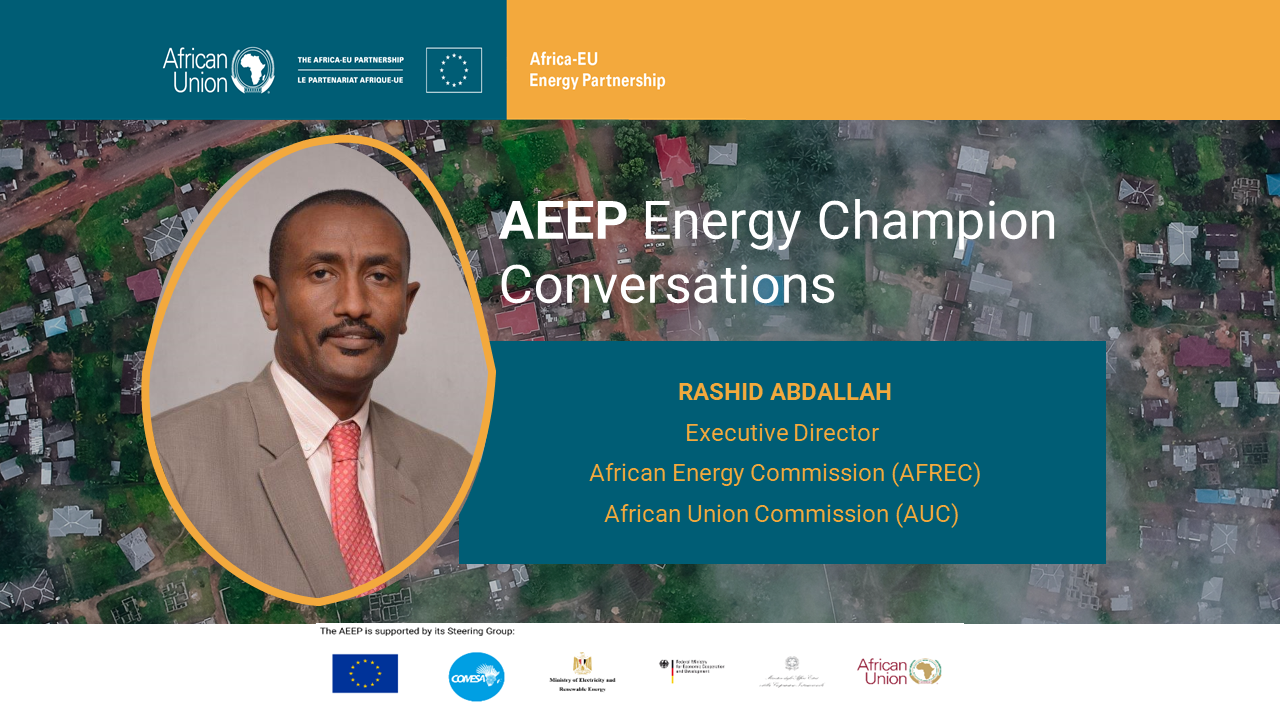AEEP Energy Champion Conversations: Rashid Abdallah

The AEEP Energy Champion Conversations is a series of interviews that highlight the work of inspirational energy experts in Africa and Europe. We meet passionate promoters of a sustainable energy transition and hear their insights on the biggest achievements so far and most pressing challenges ahead.
Universal access to clean, appropriate and affordable energy is a prerequisite for well-being and economic development as envisioned by the UN 2030 Agenda for Sustainable Development, the UN Paris Agreement on Climate Change, the African Union’s Agenda 2063 and the EU’s Comprehensive Strategy with Africa.
As the gateway for joint action on a green energy future, the Africa-EU Energy Partnership (AEEP), in this series accentuates visions of key energy actors on how to achieve universal access to affordable, sustainable and modern energy services in Africa.
RASHID ABDALLAH, Executive Director of the African Energy Commission (AFREC), African Union Commission (AUC)
1. When, how and why did you start to work for a sustainable energy future?
My journey with energy started 20 years ago. Immediately when I graduated from university, I joined the government owned utility in my country. From that point on, and during my work in project development, as I saw the need for energy, not only for economic development, but also for elevating from poverty, I realised that this is an important dimension in peoples’ lives.
The most significant part was when I joined the Africa Union Commission (AUC). I joined as a project manager for the Geothermal Risk Mitigation Facility (GRMF) for East Africa. This is a unique one, because it is an attempt to enable the African Member States to use their own resources, which are rich in all dimensions, and geothermal is a part of it. Only in geothermal, we have an estimated 15 GW available in the Eastern African Region, but due to the challenges related to the risk of upfront cost and how the geothermal energy is utilised, we could not materialise the potential, so GRMF was created as a facility to fast track the geothermal development in East Africa. Later, I engaged in several areas of energy sub-sector development, capacity building and increased access to clean, reliable, and affordable energy at the continental, regional and national level. All these represent my contribution and effort to engage with sustainable development.
2. Tell us about some of the most successful steps that you have been involved in so far to achieve sustainable, affordable and modern energy for all in Africa?
I return to my contribution to establish the GRMF, because it is really a unique one. I came to the AUC as a project manager of this facility. At that time, it was a very new facility. It had a different modality of operation because we gave direct grants, not only for public institutions, but also for private sector developers. The structure was also very complicated. It took me time to establish this facility, but when I look back now, I see that this facility is still running. More than 39 projects have benefitted and received grants of up to USD 130 million. Of course, these grants are not for whole project development by they mitigate upfront costs related to geothermal exploration drilling or surface studies.
It is just a small contribution from my side to this facility. I cannot claim big achievements, I am contributing with others. My contribution as a person is very limited compared to many stakeholders and colleagues who I work with in several fields.
In conclusion, the establishment of GRMF within the AU is a big achievement, and we hope to have big achievements also here at the African Energy Commission (AFREC). I hope to see more similar facilities in other energy sub-sectors. You know, the road is made by steps, everyone has his or her own steps, but the road belongs to everyone.
3. Africa and Europe have an established and dedicated partnership on energy. What do you see as the particular strength of this partnership? If we had an initiative to intensify and accelerate that partnership’s impact, what would be your aspirations for such a framework?
The relationship between Africa and Europe is very important – one cannot choose his or her neighbours. The geographical location for the two continents is unique, we are closer to each other than to anyone else. Culturally, we also contribute to each other, and our destination is the same. The partnership is a very natural one and something found within us.
The partnership covers every aspect of our lives, from agriculture to energy, and trade. When I look at what can strengthen this, I think knowledge sharing could be one of the main aspirations that I would like to see, considering the advancements in Europe on capacity building. Today, we are talking about around 50 per cent of our population without access to electricity and around 900 million people without access to clean cooking. Capacity building in all sectors and at all levels is a necessity.
Last but not least, and perhaps the most important point, is that this partnership could support Africa to build manufacturing facilities for renewable energy technology, so that Africa will not always remain as a consumer or depend on others to manufacture. Europe is well position to play a role in this and, by doing so, we can create jobs for our people and at the same time fill the energy access gap.
4. How do we ensure that the shift away from fossil fuels to sustainable energy solutions happens in a just way that includes even the most marginalised groups in society?
In AFREC, we always try to emphasise the fact that when we talk about an energy transition, we need to look at the unique situation in Africa. In terms of emissions, Africa is the least contributing continent in the world. In terms of energy poverty, half of the population does not have access to electricity. In terms of resources, we have huge resources that are available around the continent. A just transition will need to secure all people with access to energy, energy in all forms, from cooking to transportation. In doing so, we do not need to depend only on fossil fuels, but at the same time, we need to create jobs for our people. In other words, an energy transition for Africa means to increase access for its population to sustainable, reliable and affordable energy by using its own resources.
5. What motivates you to keep pushing for a clean energy transition?
I remember my village, where they don’t have electricity. Still today, in Africa, our mothers spend a lot of time collecting firewood for cooking. I remember in my youth how people did not have jobs, because there was no energy for production. I remember our farmers who cannot cultivate their land because there is no energy. I feel that energy is life, and wherever you look in Africa, you can always find a reason to push further to secure energy for all African people.
Rashid Abdallah is the Executive Director of the African Energy Commission (AFREC) at the African Union Commission (AUC). He holds aMSc in Project Management, a Post Graduate Diploma in Energy Engineering and a B.Sc (Hons) in Mechanical Engineering. He has two decades of experience in the energy sector at the national, regional and continental levels. Mr. Abdallah has worked on energy policy, energy planning, energy projects planning and energy projects implementation.
Read more:





